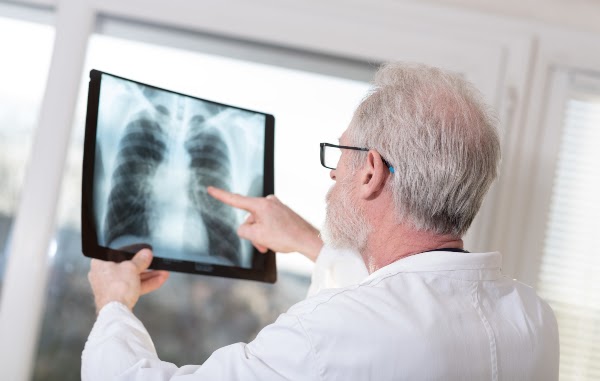
Radiologists and healthcare providers of all kinds should always prioritize their awareness of illnesses or injuries that have begun to occur more frequently, whether the instances are being described as an “outbreak” or just as a trend that is increasing over time. One such example is the recent occurrences of cases of e-cigarette or vaping product use-associated lung injury, also known as EVALI. The Centers for Disease Control and Prevention (CDC) recently released an in-depth report focused on this outbreak, its evolution, and its potential causes, which can guide radiologists moving forward as they may be faced with cases of EVALI in their own practices. Keep reading to learn more about this illness and how radiologists can best serve patients with EVALI in 2020.
What is EVALI?
First recognized by the CDC during the summer of 2019, EVALI is a dangerous lung disease linked to the usage of e-cigarettes and other vaping products. It was identified following an influx of severe lung infections that began to arise in otherwise healthy individuals, which sometimes ended up being fatal. Upon further study, a common link was found – all patients reported that they had recently used some type of vaping product. Symptoms of EVALI include fever, chills, cough, trouble breathing, shortness of breath, and chest tightness. In the most severe cases, the condition can cause the lungs to completely stop functioning. Unfortunately, many of the symptoms mimic symptoms of the flu or other respiratory illnesses, which can make immediate diagnosis difficult. The illness can appear days or even weeks after a vaping product is used, and is almost exclusively seen in younger people.
CDC Findings
In mid-January 2020, the CDC released extensive reports addressing EVALI and providing more information about the illness, the outbreak, and what may be influencing it. As of January 14, 2020, the CDC has reported 2,668 hospitalized cases of EVALI from all 50 U.S. states, as well as the District of Columbia, Puerto Rico, and the U.S. Virgin Islands – including 60 deaths. Cases increased significantly in August 2019 and peaked in September, and although they have been gradually declining since, they are still being reported and EVALI is still considered to be a significant concern. States with the highest number of cases include New Jersey, Pennsylvania, New York, Indiana, Florida, Minnesota, and Utah. As studies advanced following the initial outbreak, the CDC has been able to come to more specific conclusions about what may be leading to the reported illnesses.
Role of THC and Vitamin E Acetate
After analyzing many cases of EVALI, the CDC came to the conclusion that vaping products containing tetrahydrocannabinol (THC) are linked to most cases of the illness. EVALI was even more prominent when those who used THC products reported getting them from informal sources, such as family members, friends, or dealers. To align with this finding, the FDA tested product samples of e-cigarette and vaping products and found that vitamin E acetate is strongly linked to the outbreak. This additive is found in certain THC-containing vaping products. In addition to the FDA tests, the CDC tested patient lung fluid from those with EVALI compared to those without the illness. Vitamin E acetate was found in the bronchoalveolar lavage fluid samples of almost all of the EVALI patients, but in none of the comparison group patients. Although vitamin E acetate is strongly linked to the outbreak, other chemicals of concern may be playing a role as well.
CDC Recommendations
Recommendations for the Public
The CDC has linked the recent decline in EVALI cases to three factors, which include increased awareness of the risk of products that contain THC, removal of vitamin E acetate from certain products, and law enforcement action related to certain products. However, new cases continue to be reported, which means that EVALI is still an ongoing issue. Overall, the CDC recommends that people refrain from using e-cigarette or vaping products that contain THC, especially from informal sources. They also strongly advise users to not add additional substances to the products they are using and to seek medical attention if symptoms occur.
Recommendations for Physicians
In order to ensure proper handling of cases of EVALI, the CDC has released guidelines for healthcare providers and radiologists who may encounter cases in their own practices. A detailed history of activity should be gathered from the patient, which should include substances used, the sources of the products, how long and how often they were used, and how they were used. Any cases of EVALI should also be reported to the clinician’s local or state health department so it can be further investigated. Knowledge of this illness is crucial for radiologists, as they should be well versed in what to be looking out for when it comes to EVALI vs. other common respiratory conditions.
Radiology Insights and Expertise from Healthcare Information Services
Any time there is an outbreak in any corner of the medical world, healthcare providers should be aware so they can continue to provide the best possible care to their patients. At Healthcare Information Services, we give radiologists the ability to give their full focus to their patients, while we handle the rest. We provide a variety of services to radiology practices around the country, including practice management and consulting, revenue cycle management, coding education, and more. We aim to create a true partnership with each practice we work with, and our services are tailored to perfectly fit the needs and goals of your individual practice. We live and breathe radiology, and we want to prove to you the impact we can have. Please contact us today to learn more about our services and experience – we can’t wait to hear from you.